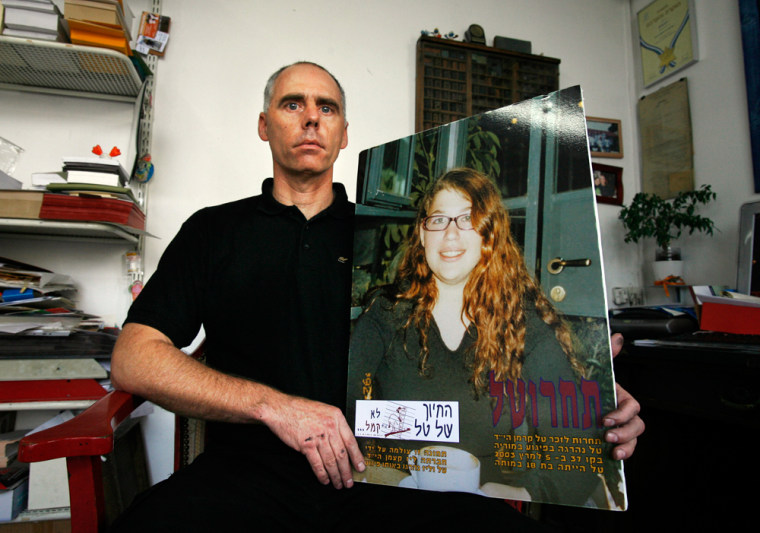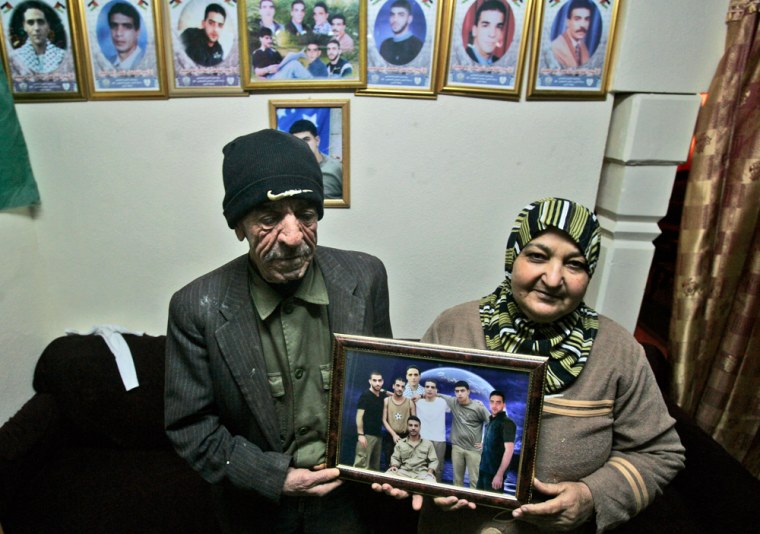Mohammed Naji’s son was killed by Israeli soldiers. Ron Kehrmann’s daughter died at the hands of a Palestinian suicide bomber.
Beyond their grief, the two fathers share something else — both are skeptical next week’s Middle East summit called by President Bush in Annapolis, Md., will do anything to end decades of conflict between their two peoples.
“I think it’s all a big waste of time,” Kehrmann said, saying the leaders on both sides are weak.
“This is not the first conference to be held,” Naji said. “None of these conferences produced peace.”
The Israeli newspaper Haaretz said Thursday a Nov. 17-dated draft of a joint document being worked on by Israeli and Palestinians negotiators showed wide gaps on issues that have derailed peace talks in the past — final borders, the status of Jerusalem and Palestinian refugees.
Palestinian envoy Saeb Erekat, identified by Haaretz as one of the draft’s authors, denied its authenticity, but he acknowledged “serious difficulties” in the negotiations. Israel wouldn’t comment on the report, though officials did not dispute its authenticity.
Little hope
Polls indicate most Israelis and Palestinians have little hope ahead of the Annapolis gathering, which is the first formal attempt to launch peace talks in seven years. More than 4,400 Palestinians and 1,100 Israelis have died in fighting since the last breakdown of talks.

Naji and Kehrmann lost their children in vastly different circumstances — and the deaths cannot be equated.
Naji’s son, Abdel Moneim, was a militant who was targeted by an Israeli undercover unit in 2004. Kehrmann’s daughter Tal was a 17-year-old girl killed four years ago while riding a bus on her way to shop for her high school graduation.
Naji has seven other sons in Israeli prisons, one of whom is expected to be among the roughly 450 Palestinian prisoners to be released in the coming days as a confidence-building measure ahead of the conference. Some 9,000 Palestinians are serving time in Israeli jails.
“I am happy he will be released, but I am sad that others are not,” Naji said.
For Kehrmann, the prisoner release touches the rawest nerve of all. Although the decision is in keeping with long-standing Israeli policy of not freeing those convicted in deadly attacks, he sees the militants set for release as “potential killers.”

Kehrmann said he doesn’t trust the Palestinians’ intentions and thinks it is a mistake to talk peace before the Palestinian leadership reins in militants and changes its mentality.
“We’ve been killing each other here for 60 years. Let’s give it a year or two of not killing and not talking and then we’ll see,” he said. “I don’t see any positive result that could come out” of the Annapolis meeting.
Poll: Few believe talks will lead to progress
In a poll released this week, 57 percent of Palestinians said they don’t believe the conference will lead to progress in peacemaking.
The poll, conducted by the independent Near East Consulting firm, surveyed 1,200 people and had a margin of error of three percentage points.
An Israeli poll, conducted in recent days by the Dahaf polling institute, said almost 70 percent of Israelis support holding the conference, but roughly the same percentage believe it won’t help move along the peace process. The institute said the survey of 500 people had a 4.5-point margin of error.
“I am full of hope that something will come out of it, but I don’t believe it. Experience has taught us that nothing comes from these gatherings,” said Yehuda Cohen, a 52-year-old Israeli green grocer.
Top Israelis pledge support for talks
Israeli Prime Minister Ehud Olmert received a boost earlier this week when a group of prominent Israeli intellectuals and former army officers pledged their support for his peace efforts. But the feeling does not appear to be trickling down to the street.
“The conflict is too deep to solve in words. We need deeds,” said Daniel Nevo, 24, from Jerusalem. “I don’t think that the conflict can be solved in my lifetime.”
The Palestinian poll indicated a slight increase in optimism. But many remain skeptical.
“I think they will not succeed,” said Nidal Khalaf, a 38-year-old restaurant operator in the West Bank city of Nablus. “If they do, I will make a huge party in my restaurant to celebrate, but it seems unlikely.”
Complicating matters is the June takeover of the Gaza Strip by the Islamic militants of Hamas. Israel’s negotiating partner, Palestinian President Mahmoud Abbas of the rival Fatah movement, rules from the West Bank and has little influence over Gaza.
On Friday, Hamas and other militant groups rallied tens of thousands of their supporters to protest the Annapolis meeting, saying no such negotiations can deliver Palestinian rights. Hamas wasn’t invited to the conference.
Israelis question point of talks
With Abbas unable to halt Gaza militants firing crude Qassam rockets into Israel almost daily, many Israelis question the point of peace talks. Israel has responded to the Hamas takeover by closing Gaza’s borders, allowing in only food and other basic humanitarian supplies.
Fayez Ali, 38, a Gaza businessman, said he prays the conference will ease the stifling closure of Gaza that has devastated his clothing business.
“I am full of hope that the conference will change our life,” he said. “We live in a hell now and we want to get out from this hell to live again as humans, to have a good economy and to have a good future.”
Shaaban Abdel Radi, 44, a Gaza farmer, said he doubts the current leadership could bring about a compromise, but said it was worth a try.
“The conference will bring nothing, but it will revive the hope in our hearts,” he said. “Hope is all we have.”